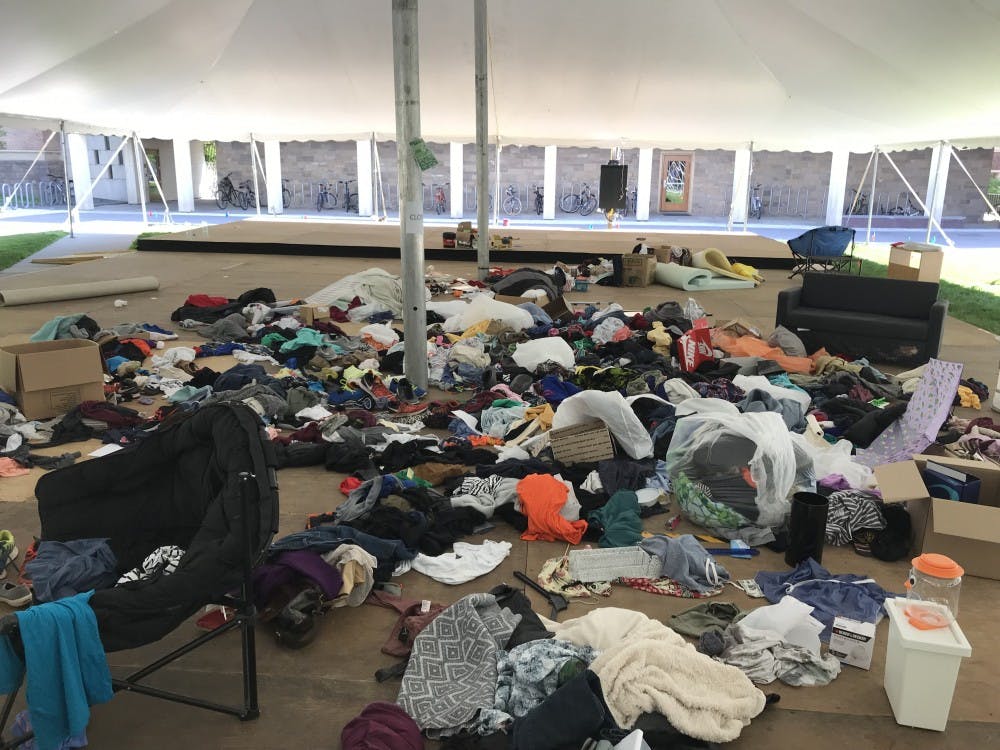HackPrinceton shirts from 2016. Four new Wilson College Council long-sleeved shirts with their CustomInk tags still on them. And the worst offenders — piles of Clash of the Colleges t-shirts, worn once before being tossed away by jaded freshmen who couldn’t care less about the falsified residential college rivalry.
These were some of the many branded Princeton tees that had been donated to the EcoReps clothing swap this past Saturday. As I hauled bag after bag of students’ unwanted shirts, shoes, and accessories to Frist for the swap, I wondered whether there could be anything done to combat this spirit of wastefulness in America’s irresponsibly consumerist economy. Princeton itself, I realized, is a top contributor to the problem. While most of the donated items were unbranded items that weren’t associated with Princeton, a fair number of the t-shirts were recognizable freebies from past events.
Clearly, if the t-shirts ended up in the donation bin, students either never really wanted or liked them in the first place or felt like they (especially seniors) couldn’t wear them after leaving campus. To minimize this reckless disposal and waste, Princeton needs to stop giving out free shirts or at least place severe limits and regulations on the trade.
For starters, let’s examine residential college gear. As freshmen, we are forced to accept and wear Clash of the Colleges t-shirts. Assuming a cost of $4 per t-shirt, that’s almost $6,000 for enough t-shirts for each freshman — for a shirt we will wear only once. OK, that’s a drop in the bucket in terms of Princeton’s budget, but imagine the amount of money spent on gear alone at every residential college. Forbes has an annual gear budget of about $30,000 (learned from my time spent serving on the College Council), and they are just a two-year college. Couldn’t this money be put to better use?
Princeton is trying to buy our happiness (what’s new?) with free clothing. But if the dollar amounts don’t get to you, consider the highly exploitative manufacturing practices for which the fashion industry is notorious. Investigations have uncovered that t-shirts are often produced in Bangladeshi factories where workers earn as little as $68 a month. Let’s not forget the more deadly accidents like the 2013 factory collapse in Dhaka, Bangladesh, that killed 1,134 works and injured over 2,500.
Even if the garments are produced responsibly, each t-shirt has an enormous environmental footprint. It takes 2,700 liters (just over 700 gallons) of water to make just one shirt (that’s enough water for one person to drink for 2.5 years), with each garment having a carbon footprint of 15 kg of CO2 over its lifetime. From the cotton that has to be farmed to the transportation around the globe, there is nothing benign about your t-shirt.
Princeton has a responsibility to reduce its carbon footprint (and get to carbon neutrality by 2046), so it must begin considering the environmental impact of all of its activities, including giving out way too many free garments to students who, at the end of the day, are going to throw much of it away at move-out. In an effort to reduce giveaway waste, therefore, the University could implement a couple of straightforward policies that ensure that people who get a clothing item want and use it.
For starters, all residential college gear should be optional. Students should be sent a registration form which they can fill out only if they want an item, but if they don’t like the gear option that fall or spring, they can simply not fill out the form. This will help to limit the number of duplicates that remain by the end of the year (for our Forbes giveaway this spring, we’ve given out only 15 percent of the baseball hats we ordered).
Second, to allow residential gear items to be reused in future years, the gear should not be branded with the class year. Once I move out of Forbes next year as a sophomore, for instance, I don’t know if I’ll want to wear the t-shirt I got as a freshman, especially after I graduate. By having a circulating “bank” of t-shirts that are washed and reused by new students every couple of years, residential colleges can cut costs and avoid having to reorder new shirts every single year. Students who love their residential college shirts can have the option to keep them, but if you’re going to throw it out anyway, at least having the option to return it to be reused would save a significant amount of resources.
Third, all student groups and University departments ordering t-shirts should consider using more environmentally friendly companies. My employee t-shirt for being an EcoRep at the Princeton Office of Sustainability is sourced by American Soil Organic, a company that uses 100% U.S.-grown organic cotton. Each shirt comes with a unique identifier code that allows the recipient to track online their shirt’s journey from growing the cotton to manufacturing to delivery. My shirt, for instance, was made with cotton grown in Texas and New Mexico before being woven in the Carolinas.
But the best way to reduce both financial and environmental costs is to stop producing the t-shirts in the first place. When planning an event, think like Marie Kondo: do you really need to give out a free shirt? Instead of throwing free shirts at all participants, organizers should give registrants the option of deciding whether they want a shirt or reconsider whether the money could be better spent on higher quality food or smaller giveaways with less of an environmental impact, like stickers.
At the end of the day, most people on campus have way too many t-shirts. Princeton as an institution needs to stop encouraging this practice of bestowing free garments on its unwilling students — by making clothing optional and sustainably sourced, the University can work to lessen its carbon footprint and reduce the buckets of t-shirts that end up thrown away at the end of each year.

Claire Wayner is a first-year from Baltimore, Md. She can be reached at cwayner@princeton.edu.








